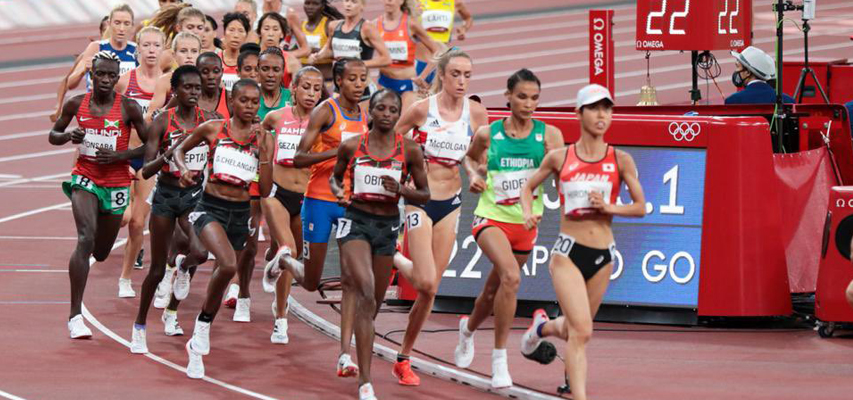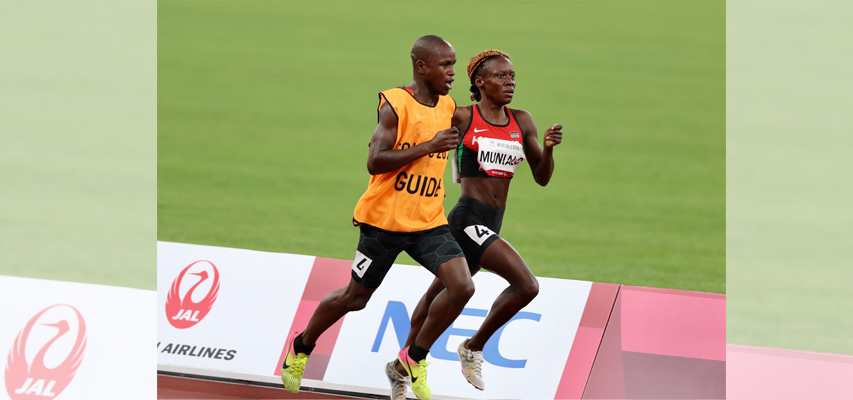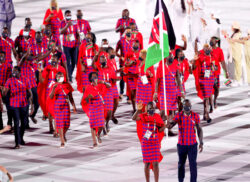
Once again, athletics provided all of Team Kenya’s medals at the 2020 Tokyo Olympics as other disciplines returned home empty-handed. The 2020 Tokyo Olympic and Paralympic Games took place in Japan amid a crippling COVID-19 pandemic, occasioning a year’s delay in the Games. Instead, the Games took place from July 23 to August 8, 2021.
The Paralympics, the event designed for athletes with visual, physical and intellectual challenges, took place in Tokyo from August 24 to September 5, 2021. The events retained the 2020 tag despite the one-year delay.
Participating for the 15th time at the quadrennial event since its debut in 1956, Kenya was among 205 nations, plus a Refugee team, that took part in the Games.
Team Kenya Paralympics debuted at the Games in 1972 in Heildelberg, Germany, and the 2020 edition was the country’s 12th appearance in Tokyo, where 163 nations competed.
Overview of Team Kenya
The 2020 Tokyo Olympic Games were Kenya’s ninth straight appearance since boycotting the 1976 Montreal and the 1980 Moscow Games. Kenya sent a total of 85 athletes in seven disciplines, as they returned to the city where the country won its first ever Olympic medal, a bronze, in 800m at the 1964 Olympics through Wilson Kiprugut Chumo.
Kenya took part in seven disciplines, with the Beach Volleyball duo of Gaudencia Makokha and Brackcides Khadambi Agala being the newest of the Team.
It was a nostalgic return for Team Kenya, but not an entirely happy one – at least not at the beginning.
The women indoor volleyball team, beach volleyball, Rugby Sevens men and women, and the two boxers took a beating in the early days of the competition.
All eyes were on the Athletics contingent, considered Team Kenya’s mainstay. The 2016 Rio Olympics was by then the most successful outing for Kenya (6 gold, 6 silver, 1 bronze) and despite the COVID-19 pandemic, Kenyans retained the confidence of another superlative performance.
But they were in for a shock when Team Kenya relinquished the 1,500m (men) gold and, for the first time ever, the other race made in Kenya, by Kenyans, for Kenyans – the men’s 3,000m steeplechase.
The Athletics team, however, clawed back their pride by winning four gold, four silver and two bronze medals under stifling heat and humidity in the Tokyo summer conditions.
The medals saw the team finish a respectable 19th overall position at the Games and, of course, the top in Africa.
Gold Medals in focus
Gold: Emmanuel Korir (800m men)
With the king of the two-lap race, David Rudisha, blighted by injuries since winning the London 2012 competition in record time (1:40.91), and Rio 2016, Kenyans had doubts as the team headed to Tokyo with Emmanuel Korir, Ferguson Rotich and Michael Saruni.
Korir, a trainee of the 1988 Seoul Olympics 800m hero, had the country on tenterhooks as he hung on at the final bend for a precious gold in 1:45.06, with Rotich (1:45.23) engaging the afterburners for an unlikely 1-2 finish.
Gold: Faith Chepngetich (1,500m women)
The headlines toyed with her first name as the country banked on the indefatigable Faith. Despite her fighting spirit, there was talk of a Dutch threat posed by Sifan Hassan and England’s Laura Muir. Chepngetich, however, took them as they came. In the final, she outran both and set an Olympic record of 3:53.11.
Marathon gold
For the second successive Olympics, Kenya won both medals in the most punishing of races.
Eliud Kipchoge and Jemimah Sumgong brought home gold from Rio de Janeiro, Brazil. Tokyo 2020 welcomed two of the world’s record holders, Eliud Kipchoge (2:01:39 set in 2018) and Brigid Kosgei (2:14:04 set in 2019) in a race staged in Sapporo, 831km north of the capital. Due to the heat in Tokyo that was hovering above 30°C, organisers settled for Sapporo as it offered 2°C to 3°C lower advantage. Both races started at 27°C on each day; August 7, 2021 (women) and August 8, 2021 (men). The Kenyans put up an incredible show.
Gold: Peres Jepchirchir (women marathon)
The Kenyan girls defied the harsh weather, such that by the 30km point of the 42.195km race, it was clear Team Kenya meant business. Ruth Chepngetich, who had sacrificed herself by setting the pace, fell off by the 25km mark, leaving Jepchirchir and Kosgei in a good position to deliver the goods. Indeed, Jepchirchir (2:27:20) guided home Kosgei (2:27:36) for gold and silver.
Eliud Kipchoge (Men marathon)
There had been a chink in the armour of marathon king Eliud Kipchoge, having been beaten for the second time in his career, at the 2020 London Marathon. Ethiopian Shura Kitata won in London on October 4, 2020 – a win that yanked the door open for the Doubting Thomases.
Kitata led a battery of other road hogs to Sapporo for a showdown that pundits said would be the ‘ultimate test’ for Kipchoge. Shock on them! Kipchoge put up a majestic performance, finishing the race with a sprint in the stifling Sapporo heat and humidity, in 2:08:38. His compatriots, Lawrence Cherono (2:10:02) finished fourth while injured Amos Kipruto dropped out. The gold was safe and back home.
Honourable mentions
Silver medalists
- Ferguson Rotich (800m men)
- Hellen Obiri (5,000m women)
- Brigid Kosgei (women marathon)
- Timothy Cheruiyot (1,500m men)
Bronze medalists
- Benjamin Kigen (3,000m steeplechase; men)
- Hyvin Kiyeng (3,000m steeplechase; women)
Boxing
Kenya’s last two medals in boxing came in the 1988 Seoul Olympics; Robert Wangila’s gold in Welterweight and Chris Sande’s bronze in Middleweight during the reign of the ‘Hit Squad’.
And so, at the 2020 Tokyo Games, the weight of expectation was on two male boxers; Nick Okoth (Featherweight), Elly Ajowi Ochola (Heavyweight) and two women – Christine Ongare (Flyweight) and Elizabeth Akinyi (Welterweight).
Nick Okoth lost in the round of 32 to Mongolia’s Tsendbaatar Erdenebatyn while Ajowi fell to Cuba’s Julio Ceasar la Cruz Peraza in the round of 16, having got a bye in the round of 32. The Philippine’s Irish Magno eliminated Ongare at the round of 32 while Akinyi lost to Mozambique’s Alcinda Helena Panguana in the round of 16 after a bye in the round of 32.
Rugby Sevens (men and women)
Kenya returned to the Olympics for a second straight time, having competed at the inaugural edition at Rio in 2016. Any hope of banishing the ghosts were quickly eroded after Shujaa fell 14-5 and later 19-14 to the US. The two defeats took the wind out of the sails of the Kenyans, and another loss, 12-7 to Ireland, confirmed the inevitable.
Wins over Japan (21-7) and Ireland (22-0) in the ranking matches proved only academic as Kenya’s challenge collapsed under the Tokyo heat. Kenya finished ninth out 12 countries.
Men’s squad
The Kenya Sevens men team, Shujaa: Andrew Amonde (KCB, captain) Alvin Otieno (Homeboyz), Vincent Onyala (KCB), Herman Humwa (Kenya Harlequin), Collins Injera (Mwamba), Daniel Taabu (Mwamba), Willy Ambaka (Kenya Harlequin), Johnstone Olindi (KCB), Eden Agero (Kenya Harlequin), Jeffrey Oluoch (Homeboyz), Nelson Oyoo (Top Fry, Nakuru), Jacob Ojee (KCB), and Billy Odhiambo (Mwamba).
Officials: Innocent Simiyu (coach), Anthony Muchiri (assistant coach), Lamch Francis (medic), Erick Ogweno (manager).
Try scorers – Two tries
- Collins Injera
- Jeff Oluoch
- One try
- Willy Ambaka
- Andrew Amonde
- Jacob Ojee
- Johnstone Olindi
- Vincent Onyala
- Alvin Otieno
- Daniel Taabu
Kenya Sevens women team, Lionesses
Tokyo 2020 was the Lionesses’ second appearance at the Games, the first being in the Rio 2016 edition. Pooled alongside illustrious nations, the Lionesses proved easy game to New Zealand, Russia Olympic Committee team and Great Britain.
The Lionesses, however, claimed the host’s scalps 21-17 in the ranking match but were pushed back by Canada 24-10 to finish 10.
Lionesses Olympic Squad: Philadelphia Orlando (Northern Suburbs captain), Sheila Chajira (Homeboyz), Stella Wafula (Impala Saracens), Christabel Lindo (Impala Saracens), Leah Wambui (Homeboyz), Judith Auma Okumu (Homeboyz), Vivian Akumu (Top Fry, Nakuru), Sarah Oluche Ndunde (Mwamba), Grace Adhiambo Okulu (Top Fry, Nakuru), Cynthia Camilla Atieno (Homeboyz), Janet Okello (Mwamba), Sinaida Aura Omondi (Northern Suburbs), Diana Awino Ochieng (Impala).
Officials: Felix Oloo (coach), Samuel Njogu (strength and conditioning coach), Ben Mahinda (medic), Camilyne Oyuayo (manager).
Try Scorers – 3 tries
- Janet Okello
1 try
- Christabel Lindo
- Grace Okulu
- Sinaida Omondi
- Camilla Atieno
- Diana Ochieng’
Final standings
- Gold: New Zealand
- Silver: France
- Bronze: Fiji
- Great Britain
- Australia
- USA
- China
- Russia Olympic Committee
- Canada
- Kenya
- Brazil
- Japan
Swimming
Kenya was represented by two swimmers; Danilo Rosafio and Emily Muteti.
Rosafio competed in the men’s 100 metre freestyle. Although he finished first in Heat 2, his time of 52.54 could only place him 56th overall out of 71.
Muteti – The Mombasa-born swimmer, represented Kenya in the women’s 50 metre freestyle event. With 16 top performers out of 83 advancing to the round of 16, Muteti’s 26.31 seconds for fourth position in Heat 6 saw her finish 43rd overall.
Beach Volleyball’s baptism of fire
The Kenya Beach Volleyball team debuted at the Olympics. As is usual for most debutants, Kenya’s pair of Gaudencia Makokha and Brackcides Agala found themselves in the deep end of the pool.
The duo lost all their matches; 2-0 (21-15, 21-9) to the Brazilian pair of Anna Patricia Ramos Silva and Rebecca Silva. They went down 2-0 (21-8, 21-6) to USA’s Sarah Sponcil and Kelly Claes. And another defeat, 2-0 (6–21, 14–21), to Latvia’s Anastasija Kravčenoka and Tina Graudiņa. But it was no shame for the Kenyans as USA eventually won gold.
Taekwondo
The sole Kenyan representative, Faith Ogalo, had to go through the repechage to earn passage to round one proper in the Women’s 67kg.
On July 27, 2021 Ogalo lost both fights (15-7 against Poland’s Aleksandra Kowalczuk; and 13-0 against Serbia’s Milica Mandić).
Tokyo 2020 Paralympics review
Team Kenya returned home with a bruised nose
Overview
The Team Kenya Paralympics arrived in Tokyo hoping for a decent outing amid concerns of inadequate preparedness, given the COVID-19 pandemic that made it difficult for athletes with special needs to train.
Nevertheless, Kenya sent nine athletes; seven for track events and one each in Para-rowing and Powerlifting. The visually impaired athletes, as a standard procedure, had their guides.
Kenya arrived in Tokyo with five records under its belt, but after grueling action that ended on September 5, 2021, Samwel Mushai’s record in 1,500m T11 had been demolished by a Brazilian.
Team Kenya Paralympic athletes and guides:
- Eric Kiptoo Sang (Guide, David Korir) – 1,500m (T11)
- Wilson Bii (Guide, Robert Tarus) – 1,500m T11, 5,000m (T11)
- Rodgers Kiprop (Guide, Alpha Malinga) – 5,000m (T11)
- Felix Kipruto – 1,500m (T46)
- Mary Waithera Njoroge (Guide, Bernard Korir) – 1,500m (T11)
- Nelly Nasimiyu Munialo (Guide, Eric Kirui) – 1,500 (T13)
- Nancy Chelangat Koech (Geoffrey Malel) – 1,500m (T11)
Para-rowing (Single Sculls – PR1W1x): Asiya Sururu Mohamed
Asiya Sururu Mohamed made history as Kenya’s first ever woman to participate in the Paralympics water events as she took part in the Women’s Single Sculls. Predictably, the going proved tough but not without precious lessons learnt. The Kenyan double amputee was placed 12th overall, registering an impressive 13:14.26 time on day two of the competition. Norway’s World Record holder Birgit Skarstein won gold.
Asiya’s timings
Day One: 13:45.50
Repechage 1: 13:14.26
Repechage 2: 14:27.48 minutes
*Repechage: (in rowing and other sports) is a contest where the best-placed of those who failed to win heats compete for a place in the final.
Powerlifting – Hellen Wawira Kariuki
Hellen Wawira Kariuki was the first Kenyan in action at the 2020 Tokyo Paralympics Games on August 26, 2021.
In a quality field that yielded a World Record via China’s Lingling Guo, who lifted 108kg, Wawira did not desecrate the Kenyan flag as she was placed fifth with a flawless lifting of up to 93kg. Indonesia’s
Widiasih Ni Nengah lifted 98kg for silver while Sarahy Clara Monasterio Fuentes of Venezuela (97kg) settled for bronze.
Final classification: Women’s 41kg Powerlifting
- Lingling Guo (China) Best lift: 108kg (gold).
- Ni Nengah Widiasih (Indonesia) 98kg (silver).
- Clara Sarahy Fuentes Monasterio (Ven) 97kg (bronze).
- Zoe Newson (Great Britain) 94kg.
- Hellen Wawira Kariuki (Kenya) 93kg.
- Cristina Poblador Granados (Colombia) 92kg.
- Lara Aparecida de Lima (Brazil) 88kg.
- Moura Baddour (Syria) 82kg.
- Maryna Kopiika (Ukraine) (no lift, three attempts).
- Leidy Rodriguez (Cuba) (no lift, three attempts).
Athletics

Kenya’s only medal, a bronze, came through Nancy Chelangat Koech in the 1,500m T11 final.
It was the second time Kenya had won a single medal in the event, the first being in the inaugural edition in Heidelberg, Germany, in 1972, when John Britton won gold in swimming.
Precious bronze for Kenya
1,500m T11 (athletes with complete or severe visual impairment)
Ran under hot and humid conditions at the Tokyo Olympic Stadium, Kenya’s representatives battled stifling heat, only for Nancy Chelangat Koech, guided by Geoffrey Kiplangat, to make it to the final. Despite Mary Waithera Njoroge, guided by Bernard Korir, finishing third in Heat 1 with a personal best of 4:52.54, she did not make it to the final. Chelangat, who had finished fourth in Heat 2, reached the final, thanks to a faster time of 4:51.68.
Chelangat, together with her elder brother Kiplangat, would deliver Kenya’s only medal – a bronze – in a season best of 4:45.58.
1,500m T11 (athletes with complete or severe visual impairment)
Eric Kiptoo Sang (Guide, David Korir) and Wilson Bii (Guide, Robert Tarus) found themselves without the company of record holder Samwel Mushai. Wilson Bii and his guide were disqualified for violating rule 6.15.4b relating to the minimum and maximum length of the guiding loop that must be observed and respected at all times during the races for Track and Road Events. Sang (4:32.73) proceeded to the final after a successful appeal, following a crash involving Brazilian guide Lutimar Paes Abreu for athlete Julio Cesar dos Santos Agripino. The crash, however, cost Sang his guide Korir, who suffered cuts during the fall. Replacement of the guide in the final impacted Sang’s title challenge as he finished sixth in 4:21.53, with Brazilian Yeltsin Jacques carting away the gold and Mushai’s World Record as he re-set it at 3:57.60.
1,500m T46 (people with a single, below or above the elbow, amputation)
Felix Kipruto was the only entrant to this event. His class does not require a guide as his impairment is physical after he fractured his right hand in three places at the age of 11. Kipruto’s campaign ended despite setting a personal best of 3:59.98 in the heats.
5000m T11 (Final) (athletes with complete or severe visual impairment)
Wilson Bii, guided by Robert Tarus, had hoped to improve on the bronze medal he won at Rio 2016, but those dreams turned into a nightmare under the Tokyo heat as he finished sixth in 17:31.73. Debutante Rodgers Kiprop, guided by Alpha Malinga, looked to be in the right frame to challenge for honours but wilted to finish fourth in a personal best time of 15:27.06.
1,500m T12 (athletes with a higher visual acuity than T11 athletes)
Nelly Nasimiyu Munialo was Kenya’s only representative in this category. Guided by Erick Kirui, she did not make the final after she was disqualified for infringing rule 7.9.3 of Paralympics regulations, in which the athlete and the accompanying guide-runner shall retain the tether attachment from start to finish.
Kenya’s performance at the Paralympics

- 1972 (Heidelberg, West Germany): One gold, no silver, no bronze;
- 1980 (Arnheim, Netherlands): 1-2-0;
- 1984 (Stoke Mandeville, Great Britain) 1-1-1;
- 1988 (Seoul) 0-4-1;
- 1992 (Barcelona) 1-0-1;
- 1996 (Atlanta) 1-1-0;
- 2000 (Sydney) 1-1-2;
- 2004 (Athens) 3-1-3;
- 2008 (Beijing) 5-3-1;
- 2012 (London) 2-2-2;
- 2016 (Rio de Janeiro) 3-1-2;
- 2021 (Tokyo) 0-0-1.
